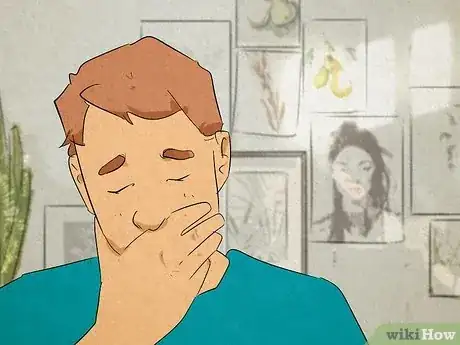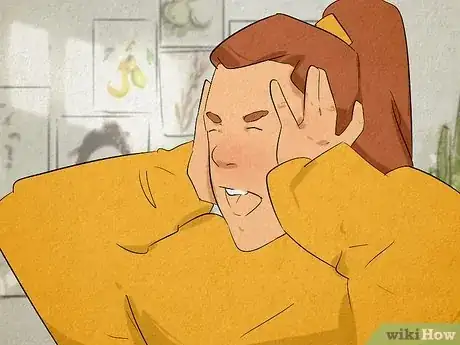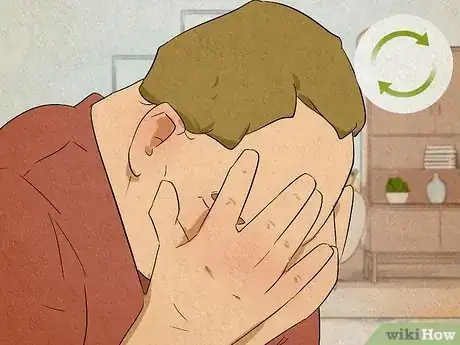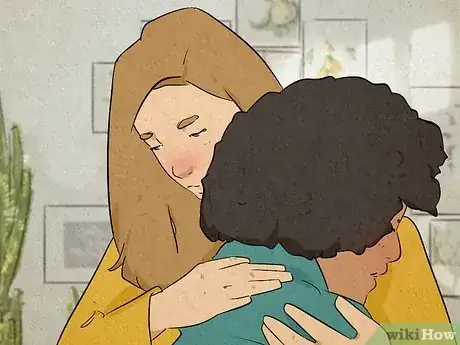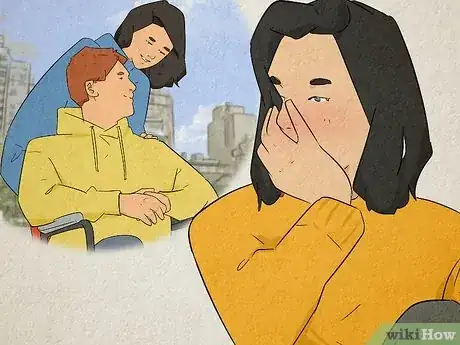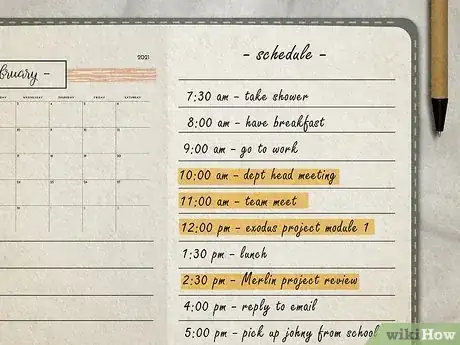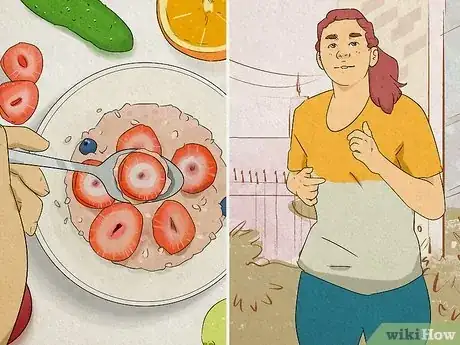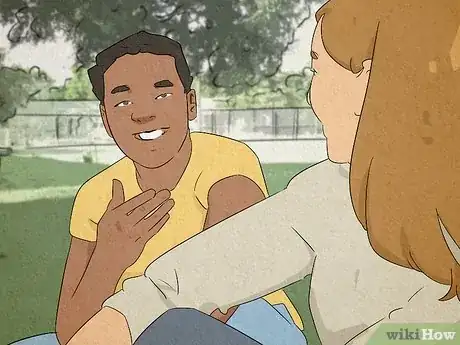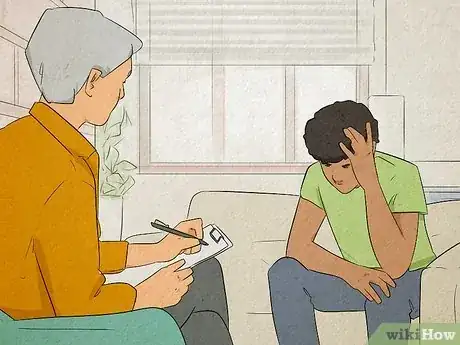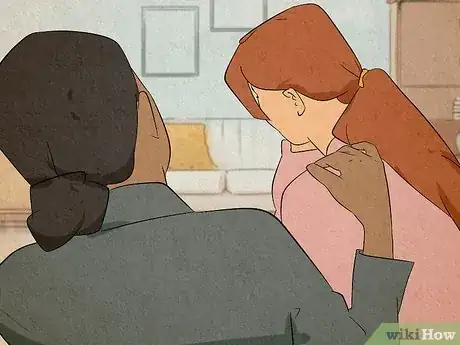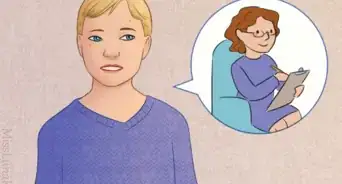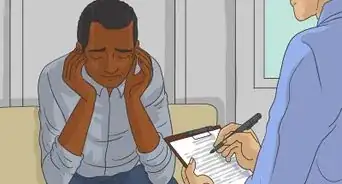This article was co-authored by Crisis Text Line. Crisis Text Line provides free, 24/7 crisis support via text. Those in crisis can text 741741 to be connected with a trained Crisis Counselor. They've exchanged over 100 million messages with people in crisis around the US and are rapidly expanding.
There are 9 references cited in this article, which can be found at the bottom of the page.
wikiHow marks an article as reader-approved once it receives enough positive feedback. This article received 12 testimonials and 100% of readers who voted found it helpful, earning it our reader-approved status.
This article has been viewed 161,516 times.
Your spouse, child, parent, friend, or another person close to you has recently died by suicide. Your world is spinning. The loss of a loved one by any means can be devastating. Knowing that your loved one chose to take their own life can add a whole new set of challenges. Passing time may help you fully grieve and adapt to the loss. In the meantime, you can learn skills to help you understand your emotions and care for yourself during this tragic period.
Steps
Preparing for an Emotional Reaction
-
1Expect shock. When you first hear the news of your loved one's suicide, it's common for family members and friends to feel numb. You might say things like "I can't believe it!" because you don't think this can be real. This feeling will go away over time as you come to accept the death.[1]
-
2Know that feeling confused is normal. Confusion is another emotion typically experienced by those who lose a loved one to suicide. You and others might constantly ask "why" this happened or "why" your loved one didn't show any signs.
- The need to make sense of the death may haunt you continuously.[2] Trying to piece together the last weeks, days, or hours of your loved ones life may help you understand better. However, you must accept that, with suicide, there will always be some unanswered questions.
Advertisement -
3Brace yourself for anger, guilt and blame. You may notice yourself feeling angry about the suicide. Your angry feelings may be guilt directed at yourself for not seeing any signs that your loved one was hurting. You may also be direct responsibility at God, at other family members, at mental health professionals for not doing enough, or at your loved one for not reaching out to you and asking for your help.
- Recognize that blaming yourself or feeling guilty is common, but it's not your fault. Blame may help you try to cope with the loss by assigning responsibility, when you are truly upset by the idea that your life and the lives of your loved ones are not in your control.[3]
-
4Face your feelings of rejection or perceived abandonment.[4] When your loved one takes their life you may think of yourself as not being good enough. You figure if your relationship with this person were "enough" then they may not have chosen to take their life. You are upset that they left you behind to deal with this devastating pain on your own.
- It's okay to feel abandoned or rejected. But, remember, suicide is a very complex ordeal to the victim and those left behind. Know that this choice was your loved one's decision because they couldn't cope with their life or certain circumstances--it's not a reflection of you.
Coping with Grief
-
1Expect your grief to come in cycles. While it's nice to think of grief as a process, that's not how it works. Your emotions can vary, and you may find yourself going in and out of the grieving process. Give yourself permission to feel your emotions and time to come to terms with what happened.
- It might take awhile for you to figure out what works for you. Things will start to get better in time.
Tip: Grief is different for everyone, so your friends and relatives may experience it differently from you. Respect their grieving process, and ask that they respect yours.
-
2Reach out to loved ones. After you learn that your loved one died by suicide you may withdraw from friends and family members. Others may cause a stronger emotional reaction of guilt or blame. Remember that these people may be just as upset by the death as you. Rather than isolating yourself spend more time with those who also loved this person. Doing so may offer you comfort.[5]
-
3Remember the fond memories.[6] As you congregate together and try to comfort one another, take the time to recall the good days you had with the deceased person. Dwelling on the hows and whys of the suicide (while understandable) won't lead to peace.
- Recounting your fond memories may bring you back to a time when this person was happy. You may choose to remember them that way.
-
4Stick to a routine. As soon as you feel able, try to return to your usual routine. Doing this will be very hard at first. Even getting dressed or cleaning your home might be painstaking activities. No, things will never be "normal" again, but establishing your routine again may help you gain a sense of purpose and structure.[7]
-
5Eat right and exercise.[8] When you are mourning a loved one's death, it can be easy to forget meals. Taking care of yourself is probably the last thing on your mind. However, eating a few balanced meals each day will give you the strength to persevere through this ordeal. Exercising - even if it is only walking your dog around the block - can help reduce the sadness or anxiety you feel and improve your mood.[9]
- As you develop your routine, include meal-planning and exercise into your schedule so that you can properly nourish your body during this stressful time.
-
6Practice self-soothing activities. All the upsetting thoughts and feelings associated with your loved one's suicide can cause you to feel sad, anxious, or even depressed. Doing activities that help you relax may ease these feelings and reinvigorate you.
- Self-soothing activities can include anything you find calming, such as wrapping up in a warm blanket, drinking hot tea, taking a hot bath, lighting aromatherapy candles, playing soothing music, sitting in front of the fire, or reading a good book.
- If you are an adolescent who finds it hard to express yourself and release stress in other ways, you might benefit from drawing out your feelings in an expressive coloring book or free-handed.
-
7Don't feel bad about having fun. Attending social events can be a form of distraction from your grieving, and to remind you that, no matter how rough things are right now, life will get better.[10]
- Distracting yourself from your emotions for a short time is not diminishing the seriousness of what you're going through. Instead, going out with friends, watching a funny movie, or dancing to favorite songs you shared with the deceased can be a great way to restore your ability to handle the grief.
- You might find yourself bowling over with laughter and then drowning in tears. That's okay, too.
-
8Seek professional help, if necessary. Suicide survivors frequently gain better understanding of what the deceased was going through by seeing a grief counselor. A counselor can explain confusing mental health issues that your loved one may have been battling. They can also help you process what you're feeling and develop healthy coping skills. This is especially helpful, if you witnessed the suicide, since such a traumatic ordeal can manifest into post-traumatic stress disorder, or PTSD.[11]
- Ask your primary care doctor for a referral or search for a professional specializing in grief after suicide.
Conquering Stigma
-
1Learn the stats associated with suicide. Educating yourself, your loved ones, and others around you can help you to make better sense of why your loved one chose to take their life. Each year in America, more than 40,000 people take their own lives. Suicide is the 10th leading cause of death in the United States, and the second leading cause for young people ages 10 to 24.[12]
- Doing some research about the whys behind suicide can help you to better understand what your loved one was going through, and maybe even save lives in the future.
-
2Don't stay silent about your grief. Quite different from other causes of death, suicide often leaves survivors feeling isolated. The stigma built up around suicide makes survivors unlikely to talk about what they're going through with others, and you may even want to keep quiet about the details of the death to avoid this stigma.[13] [14]
- Talk to your friends and loved ones about your thoughts and feelings is essential to the healing process. Be courageous and seek out others with whom you can share your story.
- You don't have to tell everyone in your local community, but open up to a few individuals you can count on for support. Staying silent about this issue could prevent others from learning about the signs and possibly saving a life.
-
3Join a support group for those affected by suicide. Getting support from other survivors, people who are also dealing with the loss of a loved one to suicide, can help you find comfort and overcome stigma.
- You can join a group facilitated by a counselor or a layperson who has personal experience dealing with grief after a suicide. Check out a few local groups to see if you feel comfortable opening up and sharing your story.[15]
- If you cannot find a local group for suicide survivors, you can access one online.[16]
Expert Q&A
-
QuestionIt has been 4 months since a young friend took his life. I still ask myself "why?" every day. I can't stop thinking about why he did it. How do I settle these thoughts?
 Crisis Text LineCrisis Text Line provides free, 24/7 crisis support via text. Those in crisis can text 741741 to be connected with a trained Crisis Counselor. They've exchanged over 100 million messages with people in crisis around the US and are rapidly expanding.
Crisis Text LineCrisis Text Line provides free, 24/7 crisis support via text. Those in crisis can text 741741 to be connected with a trained Crisis Counselor. They've exchanged over 100 million messages with people in crisis around the US and are rapidly expanding.
24/7 Crisis Counseling Losing someone close to you is one of the hardest things a person can go through, particularly if that person has taken their own life. Remember that it is not your fault. This was an incredibly personal decision for your friend. The thoughts that you are having about ‘why’ are normal to have when trying to understand loss. In order to work through this difficult time, surround yourself with a support system, consider reaching out for professional help if you feel you need it, and remember to take care of yourself even when it feels hard.
Losing someone close to you is one of the hardest things a person can go through, particularly if that person has taken their own life. Remember that it is not your fault. This was an incredibly personal decision for your friend. The thoughts that you are having about ‘why’ are normal to have when trying to understand loss. In order to work through this difficult time, surround yourself with a support system, consider reaching out for professional help if you feel you need it, and remember to take care of yourself even when it feels hard. -
QuestionMy older sister by about 5 years committed suicide and I found her body and I keep on having flashbacks. What can I do to stop them?
 Crisis Text LineCrisis Text Line provides free, 24/7 crisis support via text. Those in crisis can text 741741 to be connected with a trained Crisis Counselor. They've exchanged over 100 million messages with people in crisis around the US and are rapidly expanding.
Crisis Text LineCrisis Text Line provides free, 24/7 crisis support via text. Those in crisis can text 741741 to be connected with a trained Crisis Counselor. They've exchanged over 100 million messages with people in crisis around the US and are rapidly expanding.
24/7 Crisis Counseling Losing someone you care about so traumatically is incredibly difficult. If you are experiencing flashbacks, it may be best to talk to someone you trust about what you are experiencing. Consider talking to a family member about what is happening and ask for help to talk to a mental health professional. Consider keeping a list of things that help you feel more grounded when you experience flashbacks.
Losing someone you care about so traumatically is incredibly difficult. If you are experiencing flashbacks, it may be best to talk to someone you trust about what you are experiencing. Consider talking to a family member about what is happening and ask for help to talk to a mental health professional. Consider keeping a list of things that help you feel more grounded when you experience flashbacks.
Warnings
- Any continual thoughts of death - your own death or others - should also be reported.⧼thumbs_response⧽
- Any prolonged depression should be reported to your doctor immediately.⧼thumbs_response⧽
- If you feel suicidal, go to your local hospital, there are trained professionals to help you.⧼thumbs_response⧽
- You may find that you want to start bad habits (e.g. nail-biting, smoking, doing drugs, drinking) while you are in grief. Perhaps you did these things at one time and are now thinking of starting up again. Get help fast! A good starting place is with your doctor or your local community services which may have many programs to help you.⧼thumbs_response⧽
References
- ↑ http://www.mayoclinic.org/healthy-lifestyle/end-of-life/in-depth/suicide/art-20044900?pg=1
- ↑ http://www.ncbi.nlm.nih.gov/pmc/articles/PMC3384446/
- ↑ http://cmhc.utexas.edu/bethatone/studentscopingsuicide.html
- ↑ http://www.ncbi.nlm.nih.gov/pmc/articles/PMC3384446/
- ↑ http://lifehacker.com/how-to-cope-when-a-loved-one-commits-suicide-1663171935
- ↑ http://www.health.harvard.edu/blog/suicide-survivors-face-grief-questions-challenges-201408127342
- ↑ http://cmhc.utexas.edu/bethatone/studentscopingsuicide.html
- ↑ http://health.usnews.com/health-news/health-wellness/articles/2015/05/14/surviving-a-loved-ones-suicide
- ↑ http://www.webmd.com/depression/features/does-exercise-help-depression
- ↑ http://cmhc.utexas.edu/bethatone/studentscopingsuicide.html
- ↑ http://www.health.harvard.edu/blog/suicide-survivors-face-grief-questions-challenges-201408127342
- ↑ http://health.usnews.com/health-news/health-wellness/articles/2015/05/14/surviving-a-loved-ones-suicide
- ↑ http://www.ncbi.nlm.nih.gov/pmc/articles/PMC3384446/
- ↑ http://www.mayoclinic.org/healthy-lifestyle/end-of-life/in-depth/suicide/art-20044900?pg=1
- ↑ http://afsp.org/find-support/ive-lost-someone/find-a-support-group/
- ↑ http://www.allianceofhope.org/
